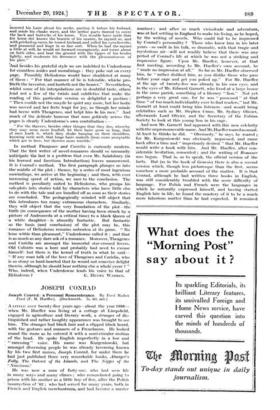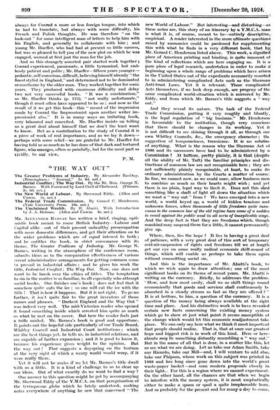A LITTLE over twenty-five years ago— about the year 1898--
• when Mr. Hueffer was living at a cottage at Lithpsfield, engaged in agriculture and literary work, a stranger of dis- tinguished and rather haughty appearance was brought to sec him. The stranger had black hair and a clipped black beard, with the gestures and manners of a Frenchman, He looked round the room as he entered it with a semi-circular motion
of the head. He spoke English imperfectly in a low and " Caressing " voice. His name was Kurgeniowski, but aniongst, discerning people he was already becoming known - by his two first names, Joseph Conrad, for under them he had just published three very remarkable books, Almayer's • Yolly, The Outcast of the Islands, and The Nigger of the 'Narcissus.'
" He - was now a man of forty-one, who had seen life in many ways and thany climes ; who remembered going to prison with his mother as a little boy of five, after the Polish • insurrection. of '02; who had served for many years, both in
• French and 'English :nierchantmen, and had- become a master
mariner ; and after so much vicissitude and adventure, was at last settling in England to make his living, as lie hoped, by the writing of novels. Who could fail to be impressed by Conrad's personality ? Those who knew him in his later years—. so swift in his talk, so dramatic, with that tragic and mysterious air—will not readily believe that there was any period of Conrad's life at which he was not a striking and impressive figure. Upon Mr. Hueffer, however, at that first meeting, according to Mr. Hueffer's own account, he "made no impression at all." So far as Mr. Hueffer observed him, he "rather disliked him, as you dislike those who pass before your cage and get you poked up." For Mr. Hueffer at the age of twenty-five was already in his own eyes, and in the eyes of Mr. Edward Garnett, who lived at a large house in the same parish, something of a literary "lion." Not yet perhaps a very great one, for he was " possessed " at that time "of too much individuality ever to find readers," but Mr. Garnett at least could bring bins listeners—and would bring celebrities such as Mr. Stephen Crane, Mr. Sydney Olivier, afterwards Lord Olivier, and the Secretary of the Fabian
Society to look at this young lion in his cage. •
And now Mr. Garnett had appeared with this new celebrity with the unpronounceable name. And Mr.Hueffer roared as usual. At least he thinks he did. "Obviously," he Says, he roared ; for Mr. Kurgcniowski was obviously impressed, and came back after a time and " imperiously desired "that Mr. Hueffer would write a book with him. And Mr. Hueffer, after con- 'Sider:able hesitation, consented ; and the writing Of Romance was begun. That is, so to speak, the official version of the facts. • -But (as in the book of Genesis) there is also a second version which, though less picturesque than the first, seems somehow a more probable account of the thatter. It is that Conrad; although he- had written three books in English, was still considerably troubled with the mere difficulty of language. For Polish and French were the languages in Which he naturally expressed himself, and having started English late in life, he found the mastery of it to be a much more laborious matter than he had expected. It remained
always for Conrad a more or less foreign tongue, into which he had to. translate, but always with some difficulty, his French and Polish thoughts. He was therefore "on the look-out" for some intelligent man of letters to help him with his English, and generally to collaborate with him ; and young Mr. Hueffer, who had had at present so little success, but was so pleased to tell you of the new plot on which he was engaged, seemed at first just the man for the job.
And so this strangely assorted pair started work. together ; Conrad experienced, passionate, a little tyrannical, but .encl. lessly patient and polite ; Mr. Hueffer—fifteen years younger— pedantic, self-conscious, difficult, believing himself already the finest stylist in England," and determined not to be dominated or overborne by the older man. They worked together for some years. They produced with enormous difficulty and delay two not very successful books. "It was a combination," so Mr. Hueffer thinks (p. 175), "not really unfortunate," though it must often have appeared to be so ; and now as the result of it we get this book—this ." record of the impression made by Conrad the Impressionist upon another writer im- pressionist also." It is in many ways an irritating book, very laboured and conceited. Mr. Hueffer insists on telling us a great deal about himself that we don't the least want to know. But as a contribution to the study of Conrad it is a piece of work of real importance, and as we lay it down— perhaps with some relief—we are grateful to Mr. Hueffer for having told us so much as he has done of that dark and tortured figure, who emerges, often so painfully, but for the most part so Vividly, to our view.
P. M.











































 Previous page
Previous page